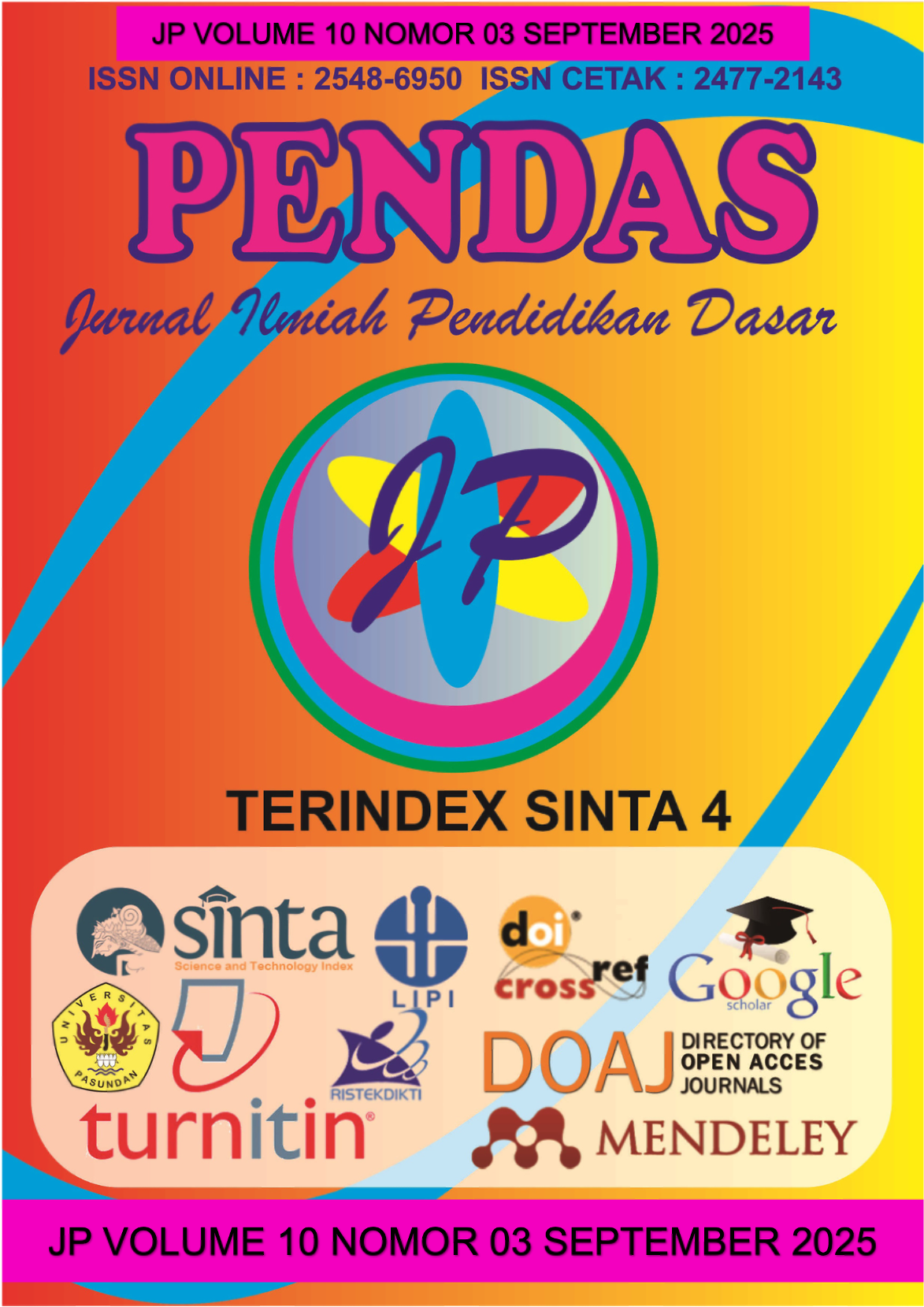PENGARUH LINGKUNGAN KELUARGA TERHADAP MOTIVASI BELAJAR PESERTA DIDIK DI KELAS IX MTS NEGERI 1 KOTA MAKASSAR
PENGARUH LINGKUNGAN KELUARGA TERHADAP MOTIVASI BELAJAR PESERTA DIDIK DI KELAS IX
DOI:
https://doi.org/10.23969/jp.v10i03.31401Keywords:
Influence, Family Environment, Learning Motivation.Abstract
The main problem examined in this study is how the family environment influences the learning motivation of Grade IX students at MTs Negeri 1 Kota Makassar. This study aims to: (1) describe the family environment of students in Grade IX at MTs Negeri 1 Kota Makassar; (2) describe the learning motivation of students in Grade IX at MTs Negeri 1 Kota Makassar; and (3) analyze the extent to which the family environment influences students' learning motivation in Grade IX at MTs Negeri 1 Kota Makassar. This research is a quantitative study using a correlational approach to determine whether there is an influence between the family environment variable and learning motivation, namely the family environment variable (X) and the learning motivation variable (Y). The study was conducted at MTs Negeri 1 Kota Makassar, with a population consisting of 500 Grade IX students. The data collection techniques used were questionnaires and documentation. The data analysis techniques used include validity tests, reliability tests, classical assumption tests, and hypothesis tests. The results of the study show that the family environment of Grade IX students is generally in the medium category, as is the students' learning motivation. The study found a significant influence of the family environment on students' learning motivation. This can be seen from the statistical analysis using the t-test and f-test, where the t-test results showed that X1 had no significant effect (sig > 0.05), while X2 significantly affected variable Y. The f-test results indicated that both X1 and X2 significantly influenced variable Y, with a significance value of 0.00 < 0.05. These results indicate that the alternative hypothesis (Ha) is accepted, and the null hypothesis (Ho) is rejected. Thus, it can be concluded that the family environment influences the learning motivation of students at MTs Negeri 1 Kota Makassar.
Downloads
References
Ade Fahira, M. I. T. and R. N. (2023). Penerapan Metode Pembelajaran Think Pair Sharedalam Meningkatkan Motivasi Belajar Peserta Didik Pada Mata Pelajaran Fiqih Kelas XI IPS 3 di MAN 2 Kota Makassar. Journal Of Islamic Laws and Studies, 2(1), 65–73.
Arif, K. dan. (2024). Peran Orang Tua dalam Mendidik Anak Sejak Dini, Cet. Komojoyo Press.
Desri Arwen. (2021). Pentingnya Peran Orang Tua Dalam Meningkatkan Prestasi Belajar Siswa. JOEAI (Journal of Education and Instruction), 4(2), 564–576.
Dibya, N. A. (2024). Psikologi Belajar Yang Efektif. CV.Garuda Mas Sejahtera.
Fauzi. (2021). Peran Keluarga Dalam Ekosistem Pendidikan, Cet 1. CV. Rumah Kreatif Wadas Kelir.
Indrawati, Muh. Aidil Sudarmono, and M. (2023). Upaya Guru dalam Meningkatkan Motivasi Belajar Peserta Didik Pada Mata Pelajaran Akidah Akhlak. Mujaddid: Jurnal Penelitian dan Pengkajian Islam, 1(2).
Mirnawati, M. (2019). Prosiding Seminar Nasional Gaya Kerja Milenial dan Tantangan Kolaborasi di Era Disrupsi Teknologi, Cet I. Ideas Publishing.
Muh Fiqri Saputra, N. A. and R. N. (2024). Efektivitas Model Problem Basad Learning terhadap Peningkatan Motivasi Belajar Peserta Didik Pada Mata Pelajaran Akidah Akhlak Kelas VIII A MTs DDI Segeri Kabupaten Pangkep. El-Fata: Journal of Sharia Economics and Islamic Education, 3(2), 184–192.
Mustafa, P. S. (2022). Peran pendidikan jasmani untuk mewujudkan tujuan pendidikan nasional. Jurnal Ilmiah Wahana Pendidikan, 8(9), 68–80.
Muzdalifah. (2023). Psikologi Keluarga Islam. Duta Media Publishing.
Nasution, W. N. (2018). Pengaruh Strategi Pembelajaran dan Motivasi Belajar Terhadap Hasil Belajar Pendidikan Agama Islam. Perdana Publishing.
Nazarudin. (2019). Pendidikan Keluarga Menurut Ki Hajar Dewantara dan Relevansinya dengan Pendidikan Islam, Cet 1. Noer Fikri.
Nengsi, R., Malik, A., & A Natsir, A. F. (2021). Analisis Perilaku Peserta Didik Slow Learner (Studi Kasus Di MTsN Makassar). Education and Learning Journal, 2(1).
Nuroniyah, W. (2023). Psikologi Keluarga. CV. Zenius Publisher.
Octamaya. (2021). Sosiologi Keluarga. Media Sains Indonesia.
Parli, G. S. H., Abdullah, N., Azhar, M., Akil, M., & Syahid, A. (2025). Peran Orang Tua Dalam Mengatasi Kenakalan Remaja Di Desa Kalumbatan Kabupaten Banggai Kepulauan. Al-Qalam: Jurnal Kajian Islam dan Pendidikan, 17(1), 86–92.
R, W. H. (2024). Membangun Keluarga Berkualitas Melalui Penerapan 8 Fungsi Keluarga,ed oleh Nia Duniawati, Cet 1. Penerbit Adab.
Rahmat, P. S. (2018). Psikologi Pendidikan, Cet I. Bumi Aksara.
Sudarmono, M. A., Wahab, A., & Azhar, M. (2020). Upaya Peningkatan Minat Belajar Baca Tulis Al-Qur’an. Jurnal Ilmiah Islamic Resources, 17(2).
Syahid, A., & Bachri, S. (2019). Pengaruh Kompetensi Guru, Motivasi Berprestasi Dan Budaya Organisasi Terhadap Kinerja Mengajar Guru MI Mitra PGMI UMI Makassar. Journal Ilmiah Islamic Resources, 16(1).
Wahab, R. (2015). Psikologi Belajar Cet I. PT.Raja Grafindo Persada.
Wati, A. K., & Muhsin. (2019). Economic Education Analysis Journal How to Cite Sejarah Artikel. Analysis Jour-nal, 8(2), 797–813.
Downloads
Published
Issue
Section
License
Copyright (c) 2025 Pendas : Jurnal Ilmiah Pendidikan Dasar

This work is licensed under a Creative Commons Attribution 4.0 International License.














































